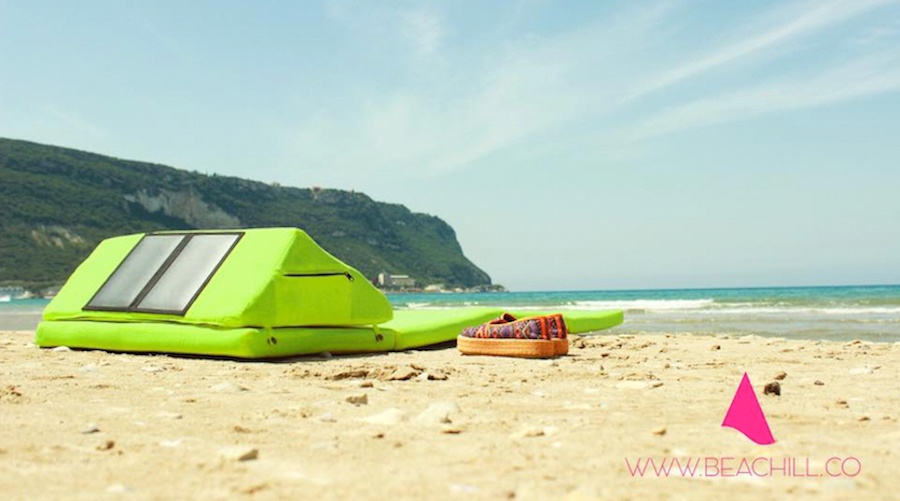Powering up your beach experience

Growing up in a country that sits along the Mediterranean coast, the beach is staple in the country’s summer activities. For many, however, it’s also a drag with a ton of inconveniences.
And for Antoine Sayah, a young 24 year old from Lebanon, the annoyances were as follows: his phone battery would die, his mat would get soaked, his neck would hurt from beach chairs, cold water would heat up too quickly, and there was no where to put your valuables if you wanted to leave your spot for a dip in the water.
In 2014, prompted by a university class project, Sayah designed an ecofriendly and waterproof beach mat, equipped with seven watt solar panels to charge phones or tablets, and a built-in cooler to keep drinks cold. The mat, called Beachill, is foldable and mobile, carries like an oversize briefcase. It also includes waterproof safety pockets to lock away your valuables.

Beach tech
Beach technologies have remained limited over the years as there are obvious hindrances to many tech gadgets: sun, sea and sand. Innovations have also remained largely uncreative - waterproof speakers or chargers, iphone powered fans, music playing coolers or more portable beach mats or chairs.
Beachill is unique in that it uses simple technology of solar panels and utilitarian design. It solves a global need among tech savvy beach goers of making laying on the beach a more convenient experience.
Entrepreneur by accident
Sayah purposely started “with baby steps”, using only Instagram and Facebook to promote his product. But after a local French newspaper caught sight of the product and ran a full spread profiling him, there was no stopping the media attention, nor the orders that came in after.
“Production wise, I couldn’t keep up in the beginning. I could barely finish two [products] per week,” he said. “I was doing it for fun. Then I started getting requests internationally. Reuters ran an interview with me and suddenly it went global. I got more than 7,000 orders.
“So here it became really challenging for me between being a student and an entrepreneur. I entered a world I didn’t at all think I would enter,” he told Wamda.
Without outside investment or a team to support him, Sayah was forced to learn the ins and outs of design, material, production, and shipment, solo. And in a country like Lebanon, the challenges were overwhelming.

Manufacturing and shipping
The manufacturing of Beachill remains in Lebanon, a hindrance for success as Lebanon’s factories can only manage up to eight or ten mats a day, Sayah said. It’s also much more expensive than manufacturing abroad.
Using imported fabric, the mat is sewn by hand in Lebanon, adding to the cost of production as labor costs are relatively high in comparison to India or China. Solar panels are also imported.
But more than anything, it’s the shipping that’s a problem for his clients, mostly abroad.
“Without enough orders, you can’t use a container to ship abroad. I’m forced to work with DHL which is very expensive,” Sayah says. “For example, I sell the product [in Lebanon] for $150. To ship it the US, the price jumps to $330 because of shipping costs.”
Thus far, Sayah has shipped across the world to countries including Australia, US, UAE, and even Brazil. Some customers have paid $400 for Beachill due to the shipping costs.
Sayah, still a student, is now looking for investors or partners to help him take Beachill’s manufacturing abroad to cut costs and expand his reach globally.
He’s also developed an eco friendly solar powered wallet to go along with your beach mat.

